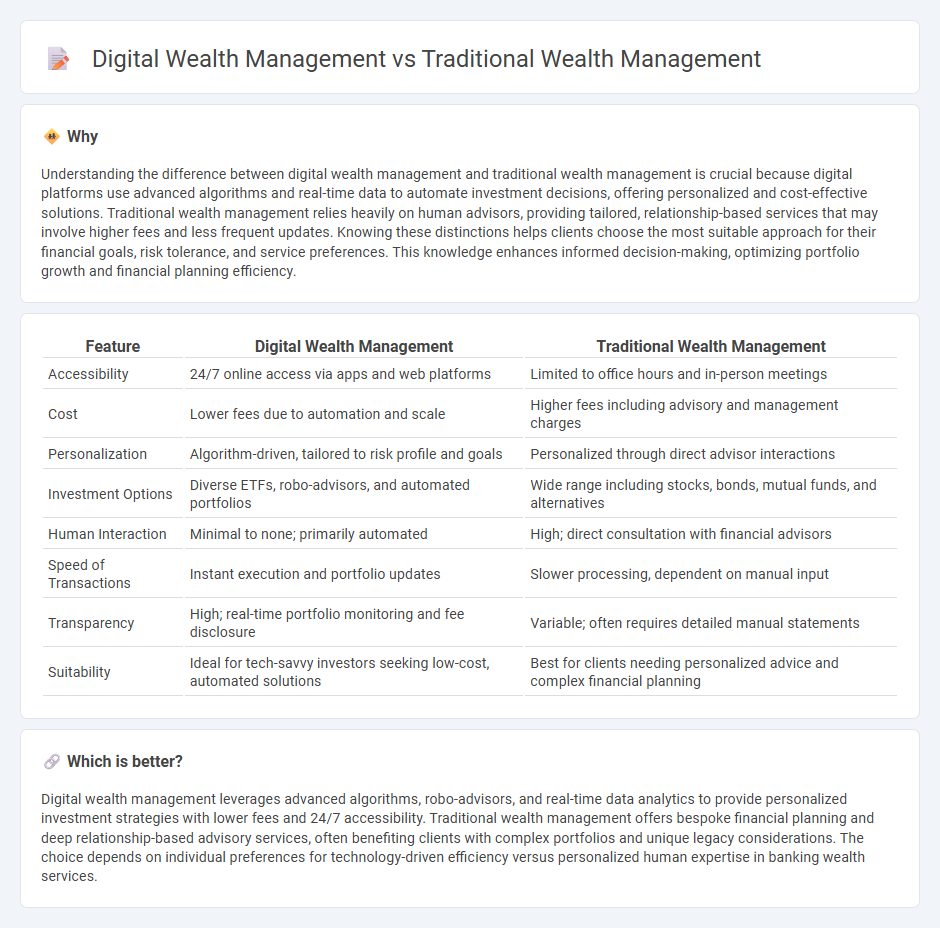
Digital wealth management leverages advanced algorithms, AI, and data analytics to offer personalized investment strategies with real-time portfolio tracking and lower fees compared to traditional wealth management. Traditional wealth management provides hands-on advisory services, deep personal relationships, and tailored financial planning typically delivered by dedicated financial advisors. Explore the evolving landscape of wealth management to discover which approach aligns best with your financial goals.
Why it is important
Understanding the difference between digital wealth management and traditional wealth management is crucial because digital platforms use advanced algorithms and real-time data to automate investment decisions, offering personalized and cost-effective solutions. Traditional wealth management relies heavily on human advisors, providing tailored, relationship-based services that may involve higher fees and less frequent updates. Knowing these distinctions helps clients choose the most suitable approach for their financial goals, risk tolerance, and service preferences. This knowledge enhances informed decision-making, optimizing portfolio growth and financial planning efficiency.
Comparison Table
| Feature | Digital Wealth Management | Traditional Wealth Management |
|---|---|---|
| Accessibility | 24/7 online access via apps and web platforms | Limited to office hours and in-person meetings |
| Cost | Lower fees due to automation and scale | Higher fees including advisory and management charges |
| Personalization | Algorithm-driven, tailored to risk profile and goals | Personalized through direct advisor interactions |
| Investment Options | Diverse ETFs, robo-advisors, and automated portfolios | Wide range including stocks, bonds, mutual funds, and alternatives |
| Human Interaction | Minimal to none; primarily automated | High; direct consultation with financial advisors |
| Speed of Transactions | Instant execution and portfolio updates | Slower processing, dependent on manual input |
| Transparency | High; real-time portfolio monitoring and fee disclosure | Variable; often requires detailed manual statements |
| Suitability | Ideal for tech-savvy investors seeking low-cost, automated solutions | Best for clients needing personalized advice and complex financial planning |
Which is better?
Digital wealth management leverages advanced algorithms, robo-advisors, and real-time data analytics to provide personalized investment strategies with lower fees and 24/7 accessibility. Traditional wealth management offers bespoke financial planning and deep relationship-based advisory services, often benefiting clients with complex portfolios and unique legacy considerations. The choice depends on individual preferences for technology-driven efficiency versus personalized human expertise in banking wealth services.
Connection
Digital wealth management integrates advanced algorithms and data analytics with traditional wealth management practices to enhance personalized investment strategies and client engagement. Traditional advisors leverage digital platforms to access real-time market insights, streamline portfolio management, and optimize financial planning. This synergy creates a hybrid approach, combining human expertise with technological efficiency for improved client outcomes.
Key Terms
Relationship Manager
Traditional wealth management relies heavily on personal Relationship Managers who provide tailored financial advice and foster long-term client trust through face-to-face interactions. Digital wealth management utilizes automated platforms and AI to deliver personalized investment strategies with efficiency and lower costs, minimizing the need for direct human involvement. Discover how combining the strengths of both approaches can optimize wealth management outcomes.
Robo-Advisor
Traditional wealth management relies on personalized service through human financial advisors offering tailored investment strategies, often at higher fees and with limited scalability. Digital wealth management leverages Robo-Advisors--algorithm-driven platforms providing automated portfolio management, lower costs, and enhanced accessibility for a broader audience. Explore the transformative impact of Robo-Advisors on investment strategies and cost efficiency by learning more about digital wealth management.
Personalized Advisory
Traditional wealth management relies heavily on in-person meetings and personalized advisory services provided by financial advisors who tailor investment strategies based on individual client goals and risk profiles. Digital wealth management leverages advanced algorithms and AI-driven platforms to offer real-time, data-driven personalized recommendations while reducing costs and increasing accessibility. Discover how the integration of technology enhances tailored financial planning and client experience in wealth management.
Source and External Links
Tradition Wealth Management Review - Tradition Wealth Management provides asset management and financial planning services, focusing on personalized investment strategies and portfolio rebalancing.
Traditions Wealth Advisors - Traditions Wealth Advisors is an independent, fee-only firm offering holistic financial planning and wealth management to high net worth individuals and businesses.
US Wealth Management Amid Market Turbulence - The traditional wealth management industry is evolving due to shifts in technology and client needs, leading to a convergence of different service models and client segments.
 dowidth.com
dowidth.com